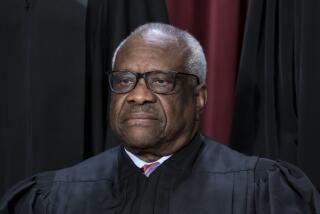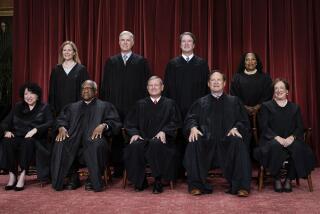Doubts Raised on Quality of Thomas Investigation : Court: Harassment charge became public late in the confirmation process, but panel’s staff knew for weeks.
WASHINGTON — The furor over the disclosure that Clarence Thomas had been accused of sexual harassment by a former aide has raised serious questions about the thoroughness and vigor of the Senate Judiciary Committee’s investigation of the controversial Supreme Court nominee.
How is it possible, after weeks of inquiries and public hearings, that the allegations came to light only days before the Senate was scheduled to vote on confirmation--especially since the committee staff had known about the charge for more than three weeks?
The answer, committee Chairman Joseph R. Biden Jr. (D-Del.) and other panel members and staff insist, is that rules designed to assure confidentiality and fairness in its operations prevented an investigation from going forward for most of that period.
Thomas’ accuser, University of Oklahoma law professor Anita Faye Hill, disputes that explanation, contending that communication between her and the committee staff broke down and that “understandings” she believed had been reached with them were not carried through.
When the FBI finally was asked to question her on Sept. 23, it found little objective evidence outside the conflicting assertions of Thomas and Hill and the statement of a friend to whom Thomas had spoken 10 years ago when the harassment allegedly occurred, sources familiar with the bureau’s report said.
The episode began in early September--Sen. Howard M. Metzenbaum (D-Ohio) said it was Sept. 3 or 4--when Senate Labor Committee aides to Metzenbaum and Sen. Edward M. Kennedy (D-Mass.) questioned Hill and two other women who had worked at the Equal Employment Opportunity Commission when Thomas headed it. Assigned to conduct a background check on the nominee, they had heard rumors of sexual impropriety and were contacting former Thomas subordinates to explore them.
“They were asked about a range of women’s issues, including rumors of sexual harassment at the agency,” Metzenbaum said. Hill made no allegation at that time, he said.
But less than a week later--on Sept. 9--Hill agreed in a follow-up conversation with Ricki Seidman, the Labor Committee aide to Kennedy, to detail offensive, sexually oriented remarks Thomas allegedly had made to her. The Kennedy aide, for reasons that are not clear, then turned the matter over to Jim Brudney, the chief counsel for Metzenbaum’s Labor subcommittee.
Brudney knew Hill from their days at Yale Law School. After talking with Hill the night of Sept. 10, Brudney discussed her allegation the next day with Metzenbaum, and the senator instructed him to refer the allegation to the Judiciary Committee, which was considering Thomas’ nomination.
Biden’s Judiciary Committee staff told Brudney that Hill would have to contact the committee, an aide to Biden said.
“Allegations of this type come up all the time (in nomination proceedings),” the Biden aide said. “Unless the person contacts us directly and is willing for us to use her name, we can’t take it any further.”
Hill contacted Harriet Grant, the committee’s nominations counsel, on Sept. 12 and began to detail her allegations about Thomas, for whom she worked at the Education Department and the EEOC.
In a second conversation later that night, Hill said she wanted her allegations “to be kept completely confidential,” Biden said. She did not want Thomas to know that she had stated her concerns to the committee, according to Biden’s account.
Grant, a Biden aide said, explained that Hill’s request for confidentiality would not be breached but that the committee could do little with the information unless Thomas had the opportunity to respond.
Given the seriousness of the allegation and the apparent credibility of the accuser, couldn’t the committee staff have conducted a preliminary investigation without advising Thomas?
“In sexual harassment cases, it is the word of the one making the charge against the person charged--and often no corroborating witnesses,” the Biden aide said.
So investigators would have to inform Thomas, he said. “That’s just due process.”
At this point, because of the confidentiality problem, the matter had reached an impasse, in the staff’s view.
But even if Hill would not speak out publicly, she said that she had told one friend about her concerns while she was at Education and then the EEOC. Grant responded that “the next logical step in the process would be to have Prof. Hill’s friend contact the committee, if she so chose,” Biden’s chronology stated.
Six days later--on Sept. 18--Hill’s friend called the committee staff and told of a conversation she had had with Hill in the spring of 1981. “Prof. Hill provided little details to her friend, but explained that Thomas had acted inappropriately and it caused Hill to doubt her own professional abilities,” Biden’s chronology stated.
The next day--a week after her last contact with the committee staff--Hill contacted Grant again and said she wanted all members of the committee to know about her allegation, but wanted to know if her name had to be used, according to Biden’s version.
Hill, however, contends that “the extent of my confidentiality was never to keep the committee members from knowing my name.” Rather, she wanted to be “sure that the names were not released to the public.”
She said it was never explained to her that her report had been placed in limbo. She said staff members had led her to believe that the inquiry was proceeding and being taken seriously by the panel. Had the extent of the confidentiality obstacle been explained to her, Hill said, she would have testified before the committee.
On Sept. 20, according to the Biden chronology and Hill, Hill and staff members talked again, and her frustration over the lack of progress boiled over. “What do I have to do in order to get this information in front of all the committee?” she said she asked.
After considering the matter and expressing her “concerns” to the committee, Hill said on Sept. 23 that she was willing to undergo an FBI interview, and it was conducted within hours.
Two days later, Hill sent a revised copy of her “statement”--not a sworn affidavit--to the committee, and, Biden’s chronology maintained, agreed for the first time to its being given to committee members.
“Every Democratic member of the committee was orally briefed, had access to the FBI report and had a copy of Prof. Hill’s statement prior to the committee vote,” the Biden chronology said.
More to Read
Get the L.A. Times Politics newsletter
Deeply reported insights into legislation, politics and policy from Sacramento, Washington and beyond. In your inbox three times per week.
You may occasionally receive promotional content from the Los Angeles Times.










